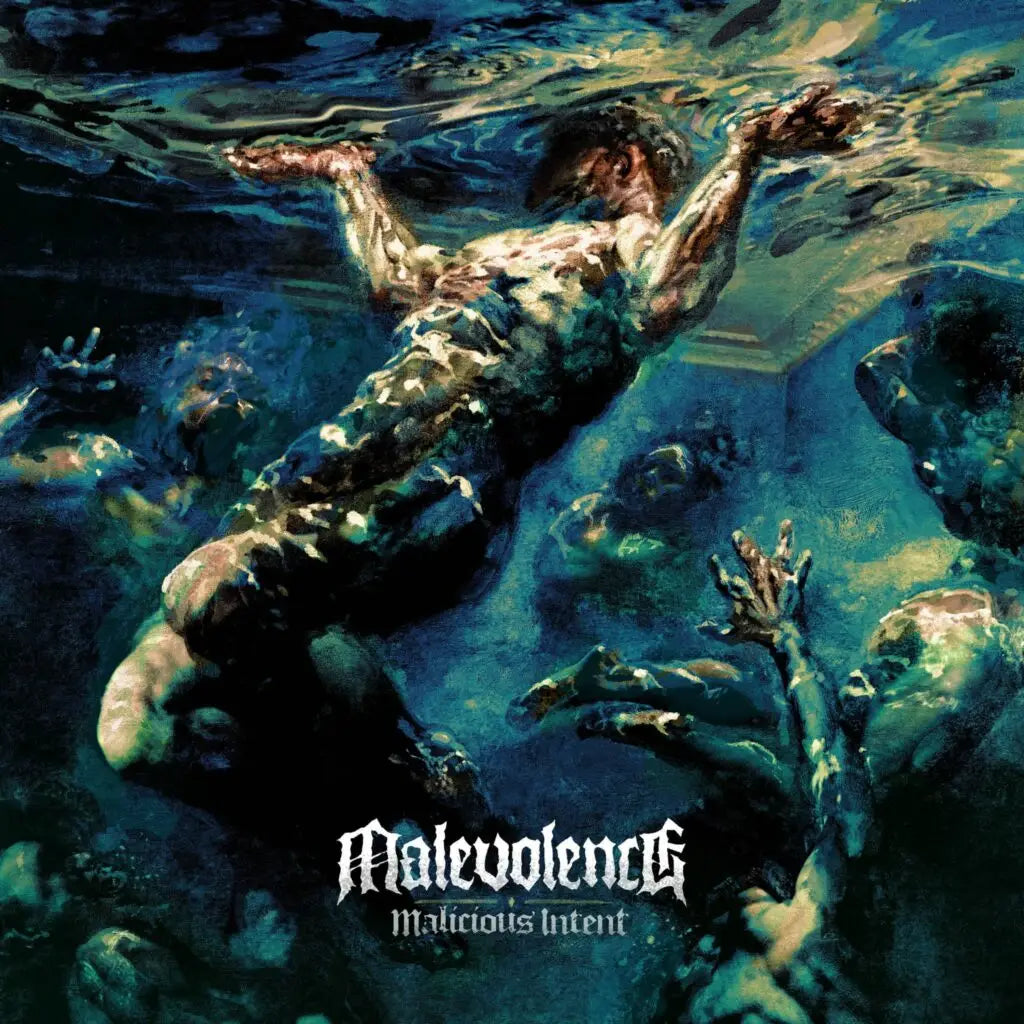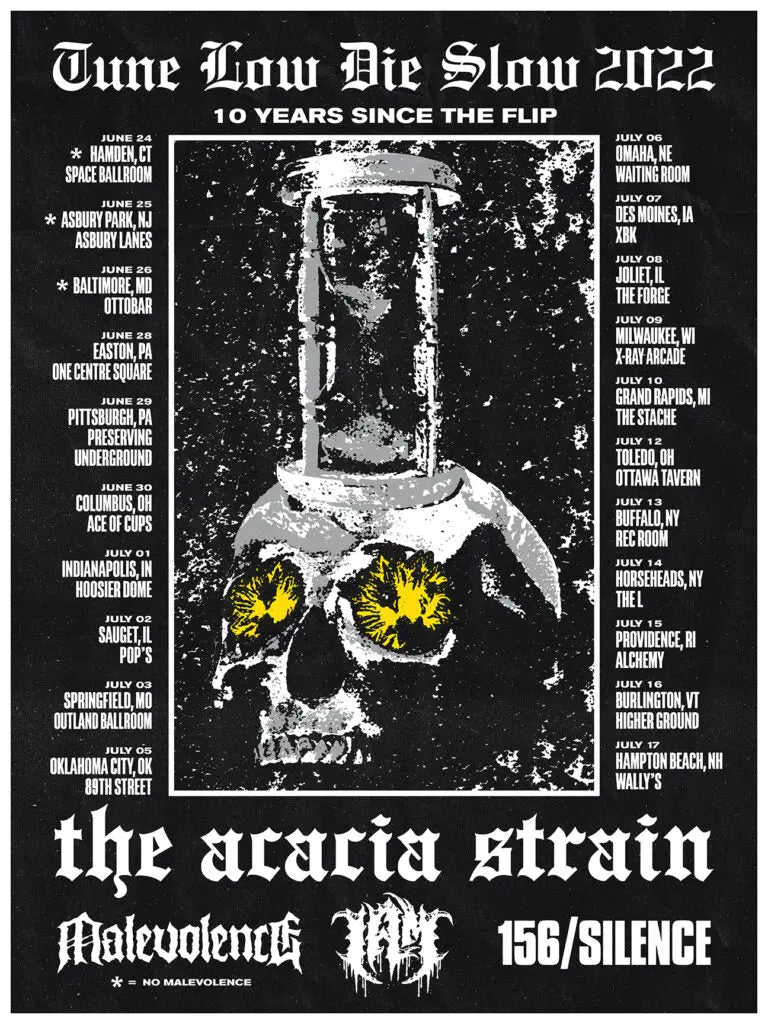Malevolence want to hit you – hard. On ‘Malicious Intent’, their third album, the songs aren’t pieces of music as much as summary executions. The new record is, in guitarist Josh Baines’s words, ‘intense and hard-hitting’. But it also offers consolation. Once Malevolence knock you over, they pick you up, dust you down, and ask that rarest of questions – how are you doing?
The journey to ‘Malicious Intent’ has been long and sometimes arduous. Malevolence (or ‘Malev’ to their fans and people who struggle with four syllables) have been in their current incarnation since 2009. They started young. Baines was fourteen when he joined the band.
Baines has known fellow guitarist and singer Konan Hall since they were eleven. They met at the bike track near their homes in the city of Sheffield in northern England. Recognising each other as kindred spirits in metal T-shirts with long hair, they were soon jamming together. They had two bands – Dark Angels (yes, plural) and Decimate – before joining bassist Wilkie Robinson and drummer Charlie Thorpe in Malevolence. Lead vocalist Alex Taylor completed the lineup.
The band is a classic case of an overnight sensation – ten years in the making. They released their debut album ‘Reign of Suffering’ in 2013 and then ‘Self Supremacy’ in 2017. They chewed up the sound of the New Wave of American Heavy Metal from the early 2000s along with modern hardcore, and spat it out on the pavements they marauded in their self-produced music videos. Intimidating affairs with flash cars (on lease) and the band in streetwear (models’ own), they developed a musical and visual aesthetic reflecting a tough world for tough young men.
They were steadily building themselves up and cut a new EP called ‘The Other Side’. They hoped someone would sign it alongside a new album.
‘No one wanted it,’ says Baines. ‘No one wanted to touch it so we were like, alright, sweet, we’ll just do it ourselves. So it means that we own everything and we’ve got full control of how it’s done.’
They established MLVLTD Music in late 2019 and released the EP in April 2020, in the midst of the raging COVID pandemic and a locked-down world. Then something strange happened. Rather than disappear without a trace, the EP’s renown started spreading – like the virus itself. They put out three videos for the EP’s contrasting songs, each of which inhabited the feelings of the uncertain new era the world found itself in. There was defiance (“Remain Unbeaten”), disdain (“Keep Your Distance” – an inadvertent anthem for social distancing) and despondency (“The Other Side”).
Malevolence leased a new warehouse space to house their merch, a practice room, and a studio (the building’s former toilet). When lockdown restrictions permitted, they put in the electrics, soundproofed, plastered and decorated. It was hours and hours of work. After ten years of rehearsing in a grim, remote industrial estate, the band created what Baines calls ‘a hub for everyone’.
They were met by adulation when they emerged to play the government-sanctioned, downsized Download Festival Pilot in July last year. Their set was early in the day, but the crowd went ballistic, roaring out the words to songs they had lived with in isolation for a year.
Malevolence played at the Bloodstock Festival the following month. I got caught in a traffic jam on my way there and thought I’d miss them. But another band pulled out due to illness, bumping Malev’s slot. I arrived in front of the main stage as they launched into the slippery groove of “Serpent’s Chokehold” from ‘Reign of Suffering’. That was the first live music I saw in 18 months. A grateful part of the crowd, I understand the euphoria and excitement Baines describes of these reborn festival appearances.
‘Malicious Intent’ was alive long before the pandemic set in. Baines and Thorpe knocked about the riffs of the album’s third single, “Still Waters Run Deep”, while they were writing ‘Self Supremacy’. They demoed the first singles from ‘Malicious Intent’ – “Life Sentence” and “On Broken Glass” – at the same time as the songs from the EP. Baines explains they held the songs back so as to ‘put together a more flowing record afterwards’.
There’s a lot of horse-trading that goes on in Malevolence when it comes to songwriting. Parts are bartered and swapped and tested in different songs. Because of the pandemic, Baines invested in a home-recording system. He traded jamming for hours on end in the practice room with Thorpe for Logic software and his Kemper amp. He started to mould the band’s songs differently.
‘I think you can tell by some of the song structures from the previous albums that there's not much of a structure there,’ he says. ‘The songs are riff after riff after riff, just continuously through-written. Whereas this time, now there's a setup, it's easier to focus on the song. If we've got a part that's cool, why wouldn't we repeat it? The crowd obviously wants to sing along to a chorus, or whatever. You know, it makes sense. And then you don't blow all your ideas on one track.’
From the solitude of home, Baines began visualising the crowd and how they would react to different parts of the songs. What might a tempo change achieve here, or this kind of chord progression there? Malevolence pack their music and take their audience on a breakneck rollercoaster ride. Baines wanted to smooth that out a little.
But he is who he is – he likes a musical challenge. The main riff to “On Broken Glass” twists and turns like a snake trying to slip the band’s grasp. “Karma” is a coiled-spring piece of Chimaira worship in which Taylor emulates one of Mark Hunter’s trademark ‘Oooo-ooowww!’’s. Its crushing, bluesy turnaround echoes the gear change in the title track from ‘The Impossibility of Reason’. Whereas the heart-freezing doom breakdown in final song “Armageddon” nails the coffin down on the comparisons with Crowbar. Perhaps fellow New Orleans act Soilent Green was always the better reference point.
‘I want to write something that's like, “Oh, that's cool,”’ says Baines. ‘ Then “Oh, actually, that's fucking sick.” Then it goes beyond. You get caught initially. And then there's a little something in there that sparks another wave of interest.’
Malevolence blur the lines between their influences, and even genres. They have a character all of their own, but enjoy signposting where that’s come from. This is most marked on “Above All Else”, featuring Matt Honeycutt from Kublai Khan. It begins with the woozy feel of Alice In Chains, as Hall croons in a smoky, small-room atmosphere. Then it is wrenched out of there by Taylor’s roared vocal break into the terrifying openness of Lamb of God territory. There's a spattering of blast beats, before Honeycutt comes in to beat the life out of the song.
For Baines, the song speaks to the band’s ambition to ‘orchestrate the crowd through the way the song moves’. The album’s engineer, Jim Pinder, kept telling the band to remember the overload of the live environment when they were tracking their instruments and how it ‘tickles all the senses’. Pinder burnished the band's sound on the album like a broadsword so that it gleams with deadly force. Baines himself later captured Taylor’s vocals in the former-toilet studio in their new HQ.
“Above All Else” has a recurrent invocation to ‘scratch the surface/see what’s lying beneath’. From the stage at recent concerts Taylor has implored his audience, particularly the men, to talk to each other. To find out what’s going on in our interior lives. The band has recently lost friends and family members to addiction and suicide, in a world that has ratcheted up difficulties for everyone in the last two years.
The band doesn’t want its fans to drown. The album’s cover by Eliran Kantor depicts ghost-like figures trapped in a glass box submerged by water. The muscular man in the foreground looks like Atlas trying to hold up the waterline itself.
‘The guy is trapped in that box with the smallest pocket of air to try and breathe, and he's obviously being dragged under,’ says Baines. ‘He's just managing to stay afloat. He can just struggle through, which is representative of a lot of families, single parents, immigrants and refugees just making ends meet.’
Here is the other face of Malevolence: compassion. When they played an acoustic set as the world was opening up last September in Birmingham, Hall and Baines got to show this face with stripped-down versions of their ballads “The Other Side”, and “Turn to Stone” from their first album. They also played a cover of Staind’s “Outside”, an unusual hit in Baines’s eyes because the chorus isn’t the focus of the song as much as its first line: ‘And you can bring me to my knees again’.
Grief and vulnerability propelled Baines to his finest moment on ‘Malicious Intent’: his searing guitar solo on “Higher Place”. He originally wrote the music as an instrumental for his grandad’s funeral, with strings, piano and a hint of guitar. The band loved it and encouraged him to transpose it into a heavier mode. Re-orchestrating the song was one of Baines’s lockdown projects. He’s been playing guitar for twenty years, since he was seven years old. The handful of choice leads on ‘Malicious Intent’ are evidence that if Baines wants guitar hero status, he can have it.
‘I wanted to put a guitar solo in it and obviously it’s quite an emotive piece of music, especially for me on a personal level,’ Baines says of “Higher Place”. ‘So I was just jamming, you know, just playing it over and over again, whatever, just having a go. And I just thought, alright, I'll hit record and see what comes out. And then it was like, literally, the first one that I played is what stayed. I don't know. It was just something about it. I listened back then and I thought, I don't need to change it. There was something weird in the air, like my granddad was there.’
The song gives the album an emotional backbone. Like Baines’s heroes, Pantera, Malevolence have tempered their bludgeon with a big-boys-also-cry sentimentality which hits just as hard. The way ‘Malicious Intent’ opens with its trio of slamming openers reminded me of a 21st-century ‘Vulgar Display of Power’. Pantera’s second album turned thirty this year and is also balanced out by introspective tracks “This Love” and “Hollow”. Malevolence don’t sound hugely like Pantera in fact, but ‘Malicious Intent’ crackles with the youthful fire of the Texans, long before singer Phil Anselmo disgraced himself barking 'White Power!' onstage in 2016.
Malevolence are now reaping the benefits of holding the line and doing it for themselves. They have licensed ‘Malicious Intent’ to Nuclear Blast for distribution. Baines says this has ‘skyrocketed our reach and marketing budgets’ and is ‘astronomically good for the band’.
They’ve also just completed an arena tour of the UK opening for Architects. Entering arenas was more intimidating than playing festival slots, when the audience comes specifically for the headliner and the support has everything to prove. Malevolence expected half-empty venues and were pleasantly surprised to find the floor filling up as they came on. The crowds knew the new singles – Baines estimates that the circle pit in London’s grand Alexandra Palace venue must have sucked in one thousand people at points.
They are returning to the Download and Bloodstock festivals to finish what they started last summer, as well as some US dates supporting The Acacia Strain. This time out they are tooled up with ‘Malicious Intent’. There’s something special about being punched in the face by a band in the ascendancy. Malevolence is more than happy to oblige.






